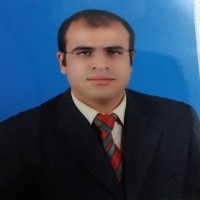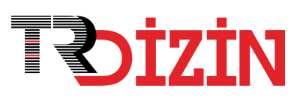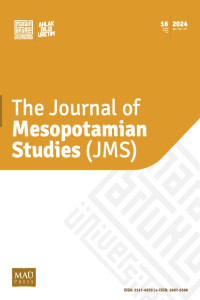Articles
Book Review
Issue Editorial Board

Assoc. Prof. Dr., Mardin Artuklu University, Kurdish Language and Culture Department

Ph.D, Mardin Artuklu University Kurdish Language and Culture Department

Assoc. Prof. Dr.


Doç .Dr.
Aim & Scope
The Journal of Mesopotamian Studies (JMS), a publication of the Institute of Living Languages of Mardin Artuklu University in Turkey, aims to publish academic studies in Turkish, Kurdish, and English in the fields of literature, language, history, sociology, anthropology, philosophy and pedagogy related to the Kurdish language and culture, which is one of the departments of our institute. The Journal of Mesopotamian Studies (JMS) contains original scholarly publications. All published articles, with the exception of editorials, translated articles, and book reviews, are subject to a double-blind peer review process.
The Journal of Mesopotamian Studies (JMS) is a double-blind peer-reviewed, open-access online journal that publishes original research articles, review articles, translated articles, and book reviews in the field of Kurdish Studies.
The main aim of the journal is to address scientific studies in the aforementioned genres in an academic and scientific style. The journal also aims to be a platform for graduate and doctoral students studying in the master's and doctoral programs of Kurdish Language and Culture and Kurdish Language and Literature departments in faculties and institutes within universities in Turkey and around the world to publish their scientific studies and to follow academic studies published by experts in the field.
- In this respect, the main goal of the journal is to publish academic and objective studies on Kurdish language, literature, and culture within the scope of Kurdish Language and Culture and Kurdish Language and Literature programs with an interactive approach. The Journal of Mesopotamian Studies (JMS), which believes in the importance of contributing to Kurdish studies at the international level, and in its editorial board works with academics from different universities around the world to achieve this goal.
- In addition, considering this feature of Kurdish, which is multi-dialectal and has two alphabets, it is within the purpose and scope of the journal to include all dialects of Kurdish in the journal and to use the Arabic alphabet as well as the Latin alphabet. In addition, all articles should include an abstract in Kurdish, Turkish, and English, and all articles in non-English languages should include an extended abstract in English.
- Manuscripts submitted to The Journal of Mesopotamian Studies (JMS) should not have been previously published or submitted for publication elsewhere.
Manuscripts that are deemed suitable for The Journal of Mesopotamian Studies (JMS) journal submission rules and the scope of the journal are sent to at least two referees who are experts in their fields for scientific evaluation. The Editorial Board members of The Journal of Mesopotamian Studies (JMS) then consider the referees' comments on each submission. The final decision for all submitted manuscripts rests with the Editor-in-Chief. The Editorial Board of The Journal of Mesopotamian Studies (JMS) is committed to abiding by the Committee on Publication Ethics (COPE) criteria.
Subject Category:
Philology
World Languages and Literatures
Social Sciences
Field of Science
Kurdish Language Literature
Kurdish Culture
Keywords:
Kurdish Dialects
Kurdish Linguistics
Kurdish History
History of Kurdish Language
Kurdish Education
Classical Kurdish Literature
Modern Kurdish Literature
Kurdish Folk Literature
Kurdish Folklore
Kurdish Sociology
Kurdish Anthropology
Kurdish Beliefs
Publication Language(s)
Full-Text Publication Language:
- Primary Language: Kurdish
- Secondary Language: Turkish
- Tertiary Language: English
Content Written in English and Latin Alphabet:
- Article Title: Kurdish, Turkish and English
- Author Name: Kurdish and Turkish (in Latin Alphabet)
- Author Address: Kurdish and Turkish (in Latin Alphabet)
- Keywords: Kurdish, Turkish & English
- Bibliography: Kurdish or Turkish (in Latin Alphabet)
Full Text: Kurdish (in Latin or Arabic Alphabet) or Turkish or English
Article Submissions
Submitted manuscripts should be appropriate to the purpose and scope of the journal. Original, unpublished manuscripts that are not in the evaluation process in another journal and whose content and submission have been approved by each author are accepted for evaluation.
Readership
The target audience of The Journal of Mesopotamian Studies (JMS) is members of all fields of Kurdish language and literature, professionals, specialists, researchers, specialization and doctoral students, as well as students interested in this field. Our journal aims to contribute to the spread of continuous professional development and research culture.
Fee Policy
The publication of articles in the journal and the execution of article processes are not subject to any fee. No processing or submission fee is charged for articles submitted to the journal or accepted for publication. The Journal of Mesopotamian Studies (JMS) does not accept sponsorship and advertisements following its publication policies. All expenses of The Journal of Mesopotamian Studies (JMS) are covered by Mardin Artuklu University Institute of Living Languages in Turkey.
Copyright
The copyright of the works published in The Journal of Mesopotamian Studies (JMS) belongs to their authors. The authors grant permission for The Journal of Mesopotamian Studies (JMS) to publish their work under a Creative Commons Attribution-NonCommercial 4.0 International (CC BY-NC 4.0) license.
Originality of Articles
The Journal of Mesopotamian Studies (JMS) does not accept papers previously published elsewhere. However, sometimes published articles in a foreign language may be treated as translated articles.
Author Guidelines
Writing Rules and Page Layout
- Manuscripts should be written on A4 size paper using MS Word or compatible programs. Times New Roman should be used as the font. Manuscripts should be written in 12 font size and 1.5 line spacing and pages should be numbered. Articles should be a maximum of 9,000 words in length. Special typefaces should not be used, and if there are transcription marks, relevant documents should be submitted.
- The title of the article should be compatible with the content, written in bold letters, and should not exceed 15 words.
- At the beginning of the article, there should be an abstract of a maximum of 200 to 250 words. For articles written in languages other than Turkish, the abstract should be written in Turkish and English as well as the original language of the article. The title of the article should also be included in the English abstract. Under the abstract, there should be keywords consisting of 4 to 6 words, ordered from general to specific.
- Headings should be written in bold letters. The use of subheadings in long articles is useful for the reader. It is recommended to number the main headings as 1., 2. and subheadings as 1.1., 1.2., 2.1., 2.2. All main and subheadings (main chapters, references, and appendices) should be written in bold letters. The Introduction and Conclusion should not be numbered.
- Indentation is not applied at the beginning of sections and paragraphs.
- Drawings, graphics, pictures, and similar materials used in the articles should be in JPEG or GIF format. Visual materials and attachments should be sent separately via e-mail when necessary.
- For articles written in Kurdish (Kurmanji, Zazakî) in the Latin alphabet, the standard Hawar Alphabet should be used.
- In a separate file, the author's name, surname, title, institution, ORCID number, and e-mail address should be indicated.
- The APA method is accepted for citation and referencing.
- In terms of writing footnotes and references, consistency within the method is essential. The names of long works (books, magazines, newspapers, etc.) are written in italics, and the names of short works (articles, stories, poems, etc.) are written in quotation marks. It is also recommended to use footnotes only for additional information that cannot be included in the text:
- If a work has a compiler, translator, publisher, or editor, it must be indicated in the bibliography.
- In citing texts in electronic media as a source, those with the author, title, and date of publication are used. In addition, the date of access should be indicated in parentheses in the imprint information.
- Use of secondary sources should be avoided for accessible sources.
- Studies that are not cited should not be included in the References section.
- References should be written alphabetically at the end of the text according to the surnames of the authors. The publishing houses of the works should be indicated clearly and the page ranges of the articles should be indicated.
- For articles written in alphabets other than Latin letters, the title, abstract, keywords, and bibliography (references) written in Latin alphabet should be included.
In-text Reference (APA) Bibliography Citation System
Single Author Book
Reference: Kökdemir, D. and Demirutku, K. (2000). Akademik Yazım Kuralları Kitapçığı. Ankara: Başkent Üniversitesi İktisadi ve İdari Bilimler Fakültesi Yayınları.
Reference: Kökdemir, D., Şenocak, C. and Demirutku, K. (2000). Akademik Yazım Kuralları Kitapçığı. Ankara: Başkent Üniversitesi İktisadi ve İdari Bilimler Fakültesi Yayınları.
Reference: Kökdemir, D., Şenocak, C., Demirutku, K., Yusufi, F., Özyurt, R. (2000). Akademik Yazım Kuralları Kitapçığı. Ankara: Başkent Üniversitesi İktisadi ve İdari Bilimler Fakültesi Yayınları.
Reference: Harvey, D. (1999a). The Urbanization of Capital. Oxford: Blackwell. Harvey, D. (1999 b). The Consciousness and Spatial Structures. Londra: Macmillan.
Reference: Şimşek H. (2000). Nitel araştırmanın planlanması. in Sosyal Bilimlerde Nitel Araştırma Yöntemleri (2nd ed.) (49-91). Ankara: Seçkin Yayınları.
Reference: Harvey, D. (1999). Müzik Tarihi. A. Coşkun (Trans.). İstanbul: Pan Yayınları.
Reference: Harvey, D. (1999 ). Modern Dünyada Sanat. A. Can (Trasn.). Modern Sanat. Ankara: Pan Yayınları, 10, 25-40.
Reference: Karancı, A.N. (Ed.). (2005). Farklılıkla Yaşamak Aile ve Toplumun Farklı Gereksinimleri Olan Bireylerle Birlikteliği. Ankara: Türk Psikologlar Derneği Yayınları.
Reference: Savaşır, I. and N. H. Şahin (Ed.). (1997). Bilişsel-Davranışçı Terapilerde Değerlendirme: Sık Kullanılan Ölçekler. Ankara: Türk Psikologlar Derneği
Reference: Sucuoğlu, B. (1997). Özürlü Çocukların Aileleri ile Yapılan Çalışmalar. in A. N. Karancı (Ed.). Farklılıkla Yaşamak Aile ve Toplumun Farklı Gereksinimleri Olan Bireylerle Birlikteliği (35-56). Ankara: Türk Psikologlar Derneği Yayınları.
Reference: Özkan, T. (2007). The Effects of the 2001 Economic Crisis on the Insurance Industry in Turkey: Increasing the Share of Foreign Capital. The Business Review, Cambridge. 9 (1), The USA, 230-236.
Reference: Warrens, A.(1997). Mental retardation and environment. in The International Encyclopedia of Psychiatry. Psychology, Psychoanalysis, and Neurology (v.7, 202-207). New York: Aesculapius Publishers.
Reference: Bernard, A. (1991). Uluslararası Anlaşmazlıkların Çözümlenmesinde Yeni Yaklaşımlar. R. Sirmen (Trans.). Dış Politika Dergisi. 7, 110-132.
Reference: Demac, A. (1991). İletişim Uyduları ve Üçüncü Dünya. in Y. Kaplan (Ed. and Trans.). Enformasyon Devrimi Efsanesi. Kayseri: Rey Yayıncılık.
Reference: Üstünipek, M. (1998). Cumhuriyetten Günümüze Türkiye’de Sanat Yapıtı Piyasası. Unpublished Ph.D Thesis. İstanbul: MSÜ. Sosyal Bilimler Enstitüsü.
Reference: The Blood Business. (1992, September 11). Time, 97, 47-48.
Reference: Amazing Amazon Region. (1998, January 12). New York Times, s.11.
Reference: Mead, J.V. (1992). Looking at Old Photographs: Investigating the Teacher Tales That Novice Teachers Bring with Them (Report No. NCRTL-RR-92-4). East Lansing, MI: National Center for Research on Teacher Learning. (ERIC Document Reproduction Service No. ED 346 082)
Reference: All information related to the indirect reference should be included.
Reference: Öztan, Z. (1996). Kurtuluş [Film]. Türkiye. Türkiye Radyo ve Televizyon Kurumu
Reference: Bulut, Y. (2009). Sansürsüz [TV Program]. Med Yapım. İstanbul: Habertürk TV.
Reference: Toprak, A. (2009). Çeşm-i Siyah [Radio Program]. İstanbul: İstanbul Radyosu.
Reference: Law No. 5846 on the Amendment of Certain Articles of the Law on Intellectual and Artistic Works (1995). Turkish Official Gazette, 22311, June 12, 1995.
Reference: Özkan, T. (2006). Sigorta Sektörünün Türkiye Ekonomisine Net Döviz Etkisi. Öneri Dergisi, T.C. Marmara Üniversitesi, Sosyal Bilimler Enstitüsü Yayın Organı. Altı Aylık Dergi, Sayı: 25, Yıl:12, Cilt:7. 91-106. Erişim Tarihi: 16 Şubat 2007, http://sbe.marmara.edu.tr/oneri/
Reference: Jacobson, J.W. (2006). A History of Facilitated Communication: Science, Pseudoscience, and Antiscience. American Psychologist, 50, 750-765. Retrieved January 12, 2006, PsycARTICLES Database
Reference: (The Banks Association of Turkey [BAT], 2009) Access Date: November 25, 2009,
http://www.tbb.org.tr/Dosyalar/istatistiki_raporlar/Uc_Aylik_Banka_Bilgileri_(Son_Donem_Karsilastirmali)_/883/Tablolar/Tablo_1-Aktif_Buyuklugune_Gore_Banka_Siralamasi.xls
Make sure the following items are present:
- Email address
- Full mailing address
- Phone number
2. All necessary files have been uploaded.
- Article text
- Copyright Agreement
3. The article has been "spell-checked" and "grammar-checked".
4. All references mentioned in the bibliography are cited in the text and vice versa.
When uploading the manuscript file, make sure that this file does not contain any elements that will decipher the identity of the author due to the double-blind review process.
Files You Need to Upload Separately:
1) Full Article Text
2) File with author information
3) Copyright Notice Text
1. I am authorized/authorized by the co-authors to submit this work to your journal.
2. The manuscript is original, has not been formally published in another peer-reviewed journal, is not under review by another journal, and does not violate any existing copyright or other third-party rights.
3. I/we agree that if the article is accepted for editorial publication, it will be licensed under the Creative Commons Attribution-NonCommercial 4.0 International (CC BY-NC 4.0) license.
4. The copyright and intellectual property rights of the author(s) or, if applicable, the author(s)' employer are reserved. The author(s) undertake(s) that the publisher is not responsible for any claims or lawsuits to be filed by third parties due to copyright infringement, and that all responsibility belongs to them.
5. The author(s) undertake(s) that there are no criminal elements or illegal expressions in the article, and that no illegal materials and methods were used during the research.
Ethical Principles and Publication Policy
JMS ETHICAL PRINCIPLES
Our journal is committed to follow the Ethical Principles stated by the international academic authorities and Higher Education Board and Turkish Interuniversity Board (ÜAK). Moreoever JMS accepts International Ethical Publishing Principles published by Committee on Publication Ethics (COPE), Directory of Open Access Journals (DOAJ), Open Access Scholarly Publishers Association (OASPA) and World Association of Medical Editors (WAME).
The studies that will be sent to be published in our journal should be prepared considering the Ethical Principles given below.
1- Scientific Research and Publication Ethics
The author cannot portray other author’s original ideas, methods, data or works partially or completely as his own work without referring to scientific rules (Plagiarism).
In scientific researches, falsified data or data that do not exist cannot be used (Forgery).
Research records or obtained data cannot be falsified, devices or materials that are not used in the research can not be shown as used, research results cannot be falsified or shaped in the interests of the supporter individuals and organizations (Distortion).
Previously published studies cannot be sent to our journal to be published (Repeated publication).
The results of a research cannot be disassembled and published more than once in a way that will disrupt the integrity of the research (Slicing).
People with no active contribution can not be included among the authors, or those who have contributed cannot be excluded from the authors, the author's ranking cannot be changed in an unjustified manner and inappropriately, nobody's name can be included among the authors by using influence even though they have no active contribution to the work (Unfair authorship)
2- Other Ethical Principles
Research conducted with support, the persons, institutions or organizations supporting them and their contributions should be stated.
Theses or studies that have not yet been submitted or accepted cannot be used as a source without the permission of the owner.
Information contained in a work for which it is commissioned for review cannot be shared with others before it is published without the express permission of the author.
Resources, places, facilities and devices provided or reserved for scientific research cannot be used out of purpose.
In the surveys and attitude researches carried out within the scope of a scientific study, the data obtained cannot be published without the express consent of the participants or if the research is to be carried out in an institution without the express consent of the institution.
In researches and experiments; animals and the ecological balance should not be damaged the competent authority should be taken, also related research and experimentations should be made in legislation or the provisions of the international agreement which Turkey is a party.
The researchers or officials should be informed about possible harmful practices in relation to scientific research and the obligation.
In scientific studies, data and information obtained from other people and institutions should be used to the extent and as permitted, the confidentiality of this information should be respected and protected.
Price Policy
Article submissions to The Journal of Mesopotamian Studies (JMS) and process operation are free. The author of the article is not charged any fees and the referees are not paid an evaluation fee.

The Journal of Mesopotamian Studies (JMS) is licensed through Attribution-NonCommercial 4.0 International.






